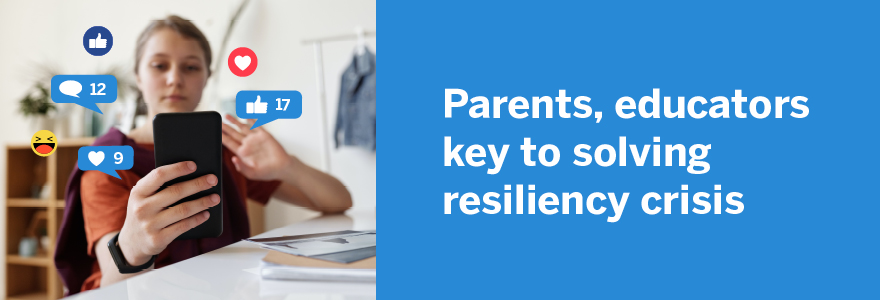
Parents, educators key to solving youth resiliency crisis

Social media and modern parenting are two reasons for the resiliency crisis that children and youth are facing. However, parents and teachers are key to solving it, because resiliency can be learned.
Education professor Karen Bax, an expert on social-emotional learning and the self-regulation of children who have experienced adversity, told community members during an online presentation that, although there are a number of factors, social media and modern parenting are two key factors contributing to higher levels of stress and anxiety for youth than in previous generations.
The statistics are staggering. Bax said between 2006-18, there's been an increase in Ontario of over 80% in the number of children and teens who have visited emergency rooms for mental health reasons. Also, six out of 10 Canadian youth expressed concerns about their anxiety level.
"There's a real mental health crisis facing children in Ontario and around the world," she said.
Social media has added to adolescents' stress, Bax said. In particular, the desire to be noticed as attractive and wanting to have their social media posts 'liked' are some of the pressure adolescents feel in the virtual world. What's more, the constant worry of how they compare to others and what is also being shared online creates further anxiety.
Social media can be a 24/7 activity if not monitored by parents and Bax reported that "research suggests high use of social media is related to increased mental health distress, self-injury and suicide, especially for girls. It has also associated with sleep deprivation and negative effects on cognitive control and lower social-emotional functioning."
Modern parenting has also added to children's stress. Bax pointed out that she wasn't judging parents, but the modern parenting movement has also contributed to youth stress and their lack of ability to bounce back from everyday stressors. She cited two types of parenting. First, there's helicopter parenting where parents hover over their child providing excessive physical and emotional safety so the child does not have as many opportunities to handle everyday stressors on their own. Second, there's lawn mower parenting where parents mow down obstacles, so their children don't have to deal with anything bad that happens to them.
These two types of modern parenting have not allowed children to face adversity and learn from it and have given children the sense that the world is a stressful and unsafe place. However, there's good news. Parents and educators can teach resiliency, said Bax. They can allow children to learn through failure, recognize what they can and can't control and realize they are not victims of their emotions.
"Emotions are really a source of information," said Bax. "If you're angry, that means some form of your self-efficacy has been hurt. Teaching children emotional literacy and problem solving are important components of resiliency."
Also, practicing mindfulness with your child - being in the present moment and not thinking about what is going to happen - can also reduce anxiety. Deep breathing is one exercise that children can use.
Parents can also establish rules for technology, said Bax. Some of these rules can include children giving their smart phone to parents at bedtime and insisting technology isn't used during meals and family time. Bax advocates for a "graduated technology approach for parents and children, much like a graduated driver's license; with parents actively monitoring type and amount of use of technology, while regularly discussing appropriate rules and risks and gradually easing up on these rules as they enter the later teenage years."
Let's Talk Education is a free event open to the general public. Speakers share their research at Western Education to facilitate discussion around important topics in education. This family-friendly seminar is meant for a general audience, but teachers, parents and education stakeholders are encouraged to attend. This year's event, scheduled for the London Public Library, was moved online due to the COVID-19 pandemic.
Anxiety statistics
83% increase in Emergency Room visits due to mental health (2006-18)
6 out of 10 youth concerned about their anxiety level
45% have low satisfaction with life (2019)
27% feel sad/hopeless (2019)
1/3 have symptoms of mental stress
9 hours a day – youth and adolescents spend using technology

